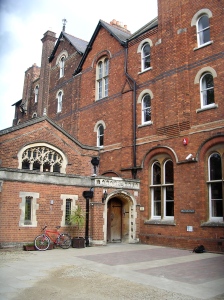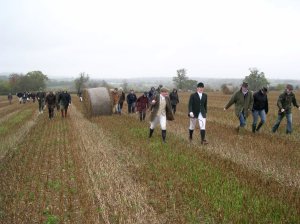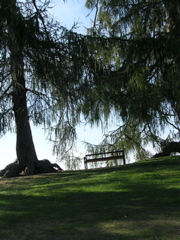One dirty diaper at a time
February 23, 2009
I started blogging because I got a full-time job at Morris Creative Group—a marketing, advertising, and branding firm—and I thought that making regular posts would be a good way to keep the rust knocked off. My senior year of college, I wrote a term paper about T.S. Eliot’s poetics. I read his poetry, especially Four Quartets, and his essays on poetry and writing poetry.
What I learned while writing that paper has stuck with me. Eliot taught me that writing a good poem takes practice. Writing is like any other discipline, meaning that it’s a discipline. Chances are, you’ll only see the fruits or rewards of your many hours of hard work years down the road.
Rather than discourage us, though, Eliot’s insights offer some good news. Good writing is not some mystical occurrence to which some people gain access by stroke of fate or from which others are excluded.
Stay at it long enough, and you will improve. Invest enough gumption, sweat, and time, and you will become a proficient writer.
Eliot talks about the dual trajectories of craft and experience. Unless you take care to hone your craft, even if that means producing a canon of doggerel, you will not have the skill necessary to capture a truly significant experience. Eliot believes that five to ten years must pass before we’ve given ourselves the chance to accumulate these transformative experiences.
The question is, are you willing to take a little time every day for the next five years in hopes that you have built up enough literary muscle to lift that boulder into the light? Are you willing to accept the mundane task of dogged day-to-day effort, knowing that the payoff may be years in the future?
The answer for most of us is no.
I’m convinced, however, that most people who publish books and enjoy a positive critical and public reception are not necessarily the naturally gifted writers who sit down when the muse strikes. They are people who carve out a half hour here and there to put pen to paper, fingertips to keypad.
What stands between you and a noteworthy achievement is your lack of discipline, not your lack of inborn talent and ability.
Sure, Shakespeare was a genius and he worked hard at it. Keep in mind, we know he was a genius because he worked hard at it. People will remember you for what you actually do, not for your potential.
Now, go change the world. One writing exercise at a time. One brick at a time. One dirty diaper at a time.
*For more of this kind of stuff, read a post I wrote at work.
Why are we here?
February 21, 2009
Oxford

Wycliffe Hall, Oxford
During the fall semester of my senior year, I studied in Oxford, England, at one of Oxford University’s colleges called Wycliffe Hall. The college takes its name from John Wycliffe, who was killed for translating the Bible from Latin into English.

Kieron Winn
These months spent living on Pullens Lane were some of the best of my life: chronically late and riding my red bike helter skelter down High Street to discuss my unfortunate use of “inflated rhetoric” with the English poet Kieron Winn or 18th-century novels with a lovely Canadian woman named Emma Plaskitt, who worked as an editor at Oxford University Press; drinking cups of Lapsang Souchong and eating scones with clotted cream and jam at the Q Bar while critiquing poems with my dear friend Nathan Sytsma, now earning his Ph.D. at Yale; and before I forgot one of the strangest events of my life, tagging along to a hare coursing.
A Hare Coursing
Everyone was wearing tweed, neckties, Wellingtons, and Barbour oilcloth jackets. Rain fell on us all day. The “hounds”—or what I call “beagles”—chased “hares”—or what I call “rabbits”—across sodden fields while all of the participants—us—passed around a big bottle of port and a little flask of Laphroaig, a very peaty single malt from Islay. I met Jules, a counter tenor who lived in London. I met Andy, who was apparently royalty in an Asian country who name I forget.

A hare coursing on a rainy day outside of Oxford.
The beagles eventually found a gap in a fence and went AWOL. We didn’t receive this news until we had fled indoors to the only pub in the middle of all that pastureland and were burning on fingers on “chips”—what I call “french fries”—amidst the aromas of wet wool, beer, and the sour-sweet musk of human bodies that have been outside all day.
We piled back out into the rain then stuffed ourselves into a tiny car to drive on muddy country lanes in a futile effort to help people I did not know locate their pack of rogue hounds. Eventually, we did see the smeared outline of the head huntsman, or whatever you call him, in his white jodhpurs and short green velvet jacket. His name? Crispin?
Thankfully, we learned from him that someone better acquainted with the area and better equipped for the task at hand had rounded up the wet mass of canine who didn’t catch a single hare that day. Somehow, I was okay with missing the sight of their dismembering and devouring him. Oh well.
We ended up at an ancient farmhouse with stone-floored stables and heavy wooden furniture polished from years of use. Here an older English couple asked us questions about the day and fed us scones and sandwiches and pushed cups of hot tea into our cold hands. I flirted with several girls I didn’t know who went to elite boarding schools in cities that I pronounced incorrectly. How was I supposed to know that “Winchester” wasn’t pronounced WIN-chess-ter but something like WEENches-tuh? Again, oh well. There wasn’t much competition anyway. Most of the English girls I met loved American men. I figured that must be because most of the English men I met looked like they’d crumble if they broke into a run.
Purple Turtle
When I got back to the States, I wrote an essay for a contest put on by the Council for Christian Colleges and Universities,the organization that runs the program. They gave me 2nd place. The winner wrote a proem, that I thought was neither good prose nor good poetry. I was probably just bitter though.
The following is an excerpt from that essay:
“Dancing is like anything else: the more seriously you take yourself, the less seriously everybody else takes you. I struck up conversation with a girl, who, like everyone in Oxford it seemed, turned out to be an American. After the customary questions—Where are you from? What school? Where is that? What are you studying?—our conversation petered out. As she stumbled away to the bar or restroom, she yelled over her shoulder: ‘English majors don’t know how to party!’
…
This will be my vocation; a constant struggle of constant change, Jacob’s wrestling with the angel and my wrestling with the Spirit: using words, literature, and my life to share the Good News. This is what Christian English majors do. This is how we party.”
The full two-page essay is still online. I’d completely forgotten about it until two or three days ago.
Funny, I’m still asking and answering the same questions: “Why do I write?” and “Why are we here?”
Shabby equipment
February 20, 2009
My friend James sent me a link to an article where I read this:
“And what drew me back, some time later, toward the possibility of faith? Poetry. George Herbert and Gerard Manley Hopkins and T. S. Eliot. One night, I was reading the last lines of “Little Gidding” to a friend, my voice thick with emotion, and when I looked up he was staring at me with kindly amusement. “So,” he said. ‘You really like that stuff?’”
Tobias Wolff talks about seeing Berman’s ”Winter Light” for the first time. The film pierced his heart, but the bad art the preacher showed at the end hardened it. Later, good art had the opposite effect, softening him.
Man oh man, have I been there.
I remember sitting on Bison Square on Lipscomb University’s campus. It was Spring. I know because the fragrance of Bradford Pear trees was in the air—part fish, part clean laundry. Someone had carried a scarred wooden desk outside and set it underneath a dogwood in bloom, its white and pink buds opening like hands.
I was reading T.S. Eliot’s Four Quartets for the first time. When I came to these lines in the second section of “East Coker“:
The only wisdom we can hope to acquire
Is the wisdom of humility: humility is endless.
I knew that was true. I didn’t started crying though until I read these lines in the fifth section:
For the thing one no longer has to say, or the way in which
One is no longer disposed to say it. And so each venture
Is a new beginning, a raid on the inarticulate
With shabby equipment always deteriorating
In the general mess of imprecision of feeling,
Undisciplined squads of emotion.
Ache filled me: the desire to know a truth beyond language and words.